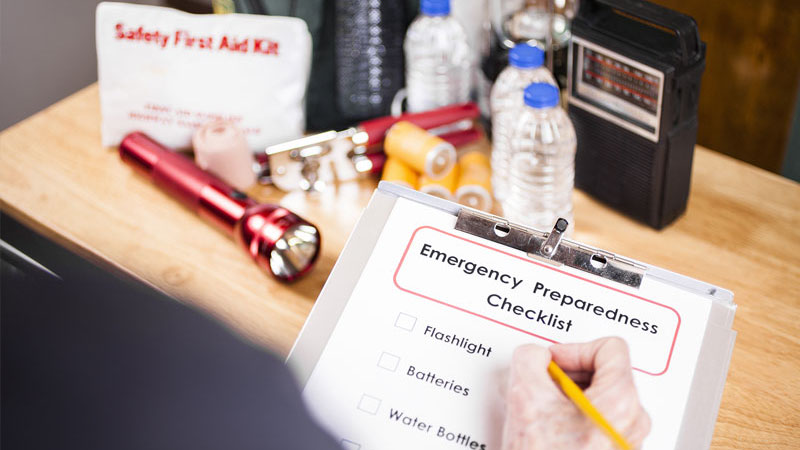
Though natural disasters and other emergencies are perilous for everyone, people 60 and older are especially vulnerable. Limited mobility, impaired hearing or vision and reduced cognitive abilities can make it more difficult for seniors to cope with these serious, potentially deadly emergencies.
Planning ahead is critical and can help put you at ease. Here are three steps you can take to prepare yourself for an emergency:
Step 1: Put together an emergency kit
- Gather water, food, batteries, medical devices and enough of your medication to last for at least three days. Don’t forget batteries for hearing aids or other medical devices. Include a list with the names and phone numbers of those in your support and health care networks, and documents such as family records, wills and bank information in a waterproof container.
- Place your kit in a backpack or suitcase with wheels. Store it somewhere you can get to it quickly.
- Label wheelchairs, walkers and other equipment with your name, address and phone number.
- If you have pets, remember to include their food and vaccination records.
- Check your kit every six months to keep it updated.
Step 2: Make a plan
- Talk with your family and support network about developing an emergency plan; decide on a place to meet, who you will contact, and other details.
- Post emergency phone numbers near your phones.
- Find safe spots within your home. For example, for a tornado, you would need to go to a basement or first floor room, preferably with no windows.
- Review how you would escape from your home if that should become necessary.
- Review your community’s evacuation plan and decide on transportation ahead of time, if needed.
- Practice your plan so to become familiar with the process.
Step 3: Be informed
- Make a list of all the potential disasters that can take place in your area. Find out how to you will get emergency warnings and include a crank-operated radio in your kit so that you can hear updates and other information.
- Speak with friends, family and neighbors about your specific needs so they can help you if needed. Talk to others who may need help as well.
In Texas: Older adults who have disabilities, who have trouble communicating, who are in a wheelchair, or who have other trouble with mobility can register with State of Texas Emergency Assistance Registry, or STEAR, by visiting www.dps.texas.gov/dem/stear/public.htm.
In Florida: Older adults with disabilities, who have trouble communicating, who are in a wheelchair or who have trouble with mobility can register with the Florida Special Needs Registry, or SERT, at https://snr.floridadisaster.org/
Being prepared will help you better handle any limitations you may face. Remember –put together a kit, make a plan and be informed to ensure you’re ready for any emergency situation that comes your way.
For more information about disaster preparedness, visit www.redcross.org and put the words “for seniors by seniors” in the search box.
